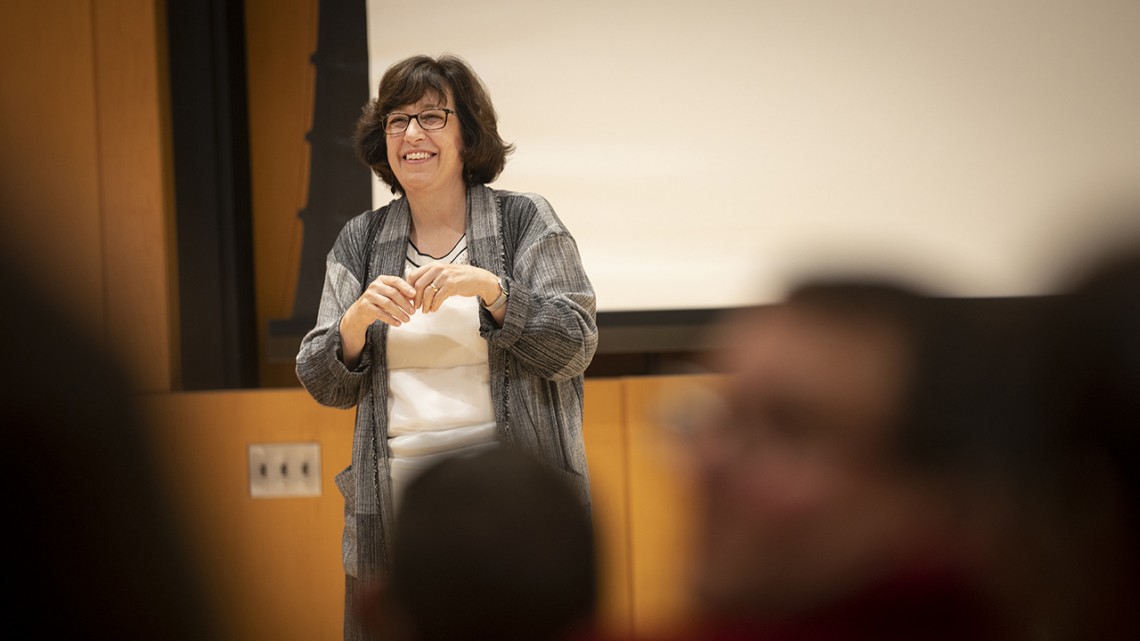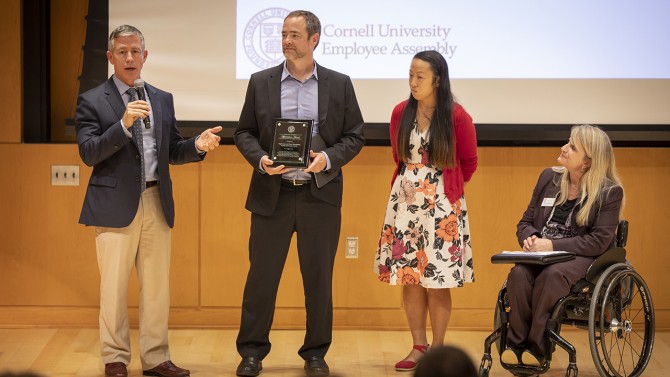
President Martha E. Pollack delivers her second annual address to staff Oct. 9 at Klarman Hall’s Rhodes-Rawlings Auditorium.
Pollack thanks staff, reviews priorities in annual address
By Nancy Doolittle
In her second annual address to staff, Cornell President Martha E. Pollack reviewed the university’s priorities, highlighted initiatives relevant to staff, and fielded questions from a full house in Klarman Hall’s Rhodes-Rawlings Auditorium. Approximately 350 attended the Oct. 9 event, with almost 400 watching the livestream.
Pollack gave an update on four university priorities, noting that every member of the Cornell community has “an important role to play in Cornell’s success.”
The first priority, she said, is academic distinction. “We have to continue to attract outstanding faculty, students and staff. And we have to build on the qualities that distinguish Cornell,” Pollack said. “Our faculty and staff have an extraordinarily wide range of expertise.”
The second, “educational verve,” involves the use of new approaches to teaching and learning, most notably through new technologies and programs, such as the Active Learning Initiative, that are proven to engage students and help them learn, Pollack said.
She also described progress in the “One Cornell” ethos, with endeavors spanning the three campuses – Ithaca, Weill Cornell Medicine and Cornell Tech – through joint degrees, collaborative research and new opportunities for undergraduate students. The New York City Visioning Committee has explored how Cornell can create opportunities in New York City that enhance and expand but not duplicate or replace what is done in Ithaca. Programs from Engaged Cornell, the College of Human Ecology and the ILR School will share new space in midtown Manhattan starting in January 2019, Pollack said.
Civic responsibility – the fourth priority – has three major components, Pollack said: “defending the notion of knowledge and truth; protecting freedom of speech; and creating a diverse, inclusive, egalitarian and just community.” She pointed to the work of the Presidential Task Force on Campus Climate, the Intergroup Dialogue Project, and the new Office of First-Generation and Low-Income Student Support as examples of progress in that area.
Other advancements she cited directly impact staff: an improved bias reporting form; implementation of a Culture of Belonging award to recognize staff who foster an inclusive workplace; and the use of surveys to assess workplace climate in individual units.
“I greatly appreciate the hard work and commitment of the many staff members who have been working on all these initiatives. And I thank you all for the many ways you as individuals help to make our campus an open, welcoming environment,” Pollack said.
Pollack also thanked the Employee Assembly for sponsoring the event and said she looks forward to collaborating with all the assemblies this year.
The EA handed out a “thank you” of its own, recognizing staff in Facilities and Campus Services’ Engineering and Project Management for their work on this summer’s central campus construction projects – much of it done behind the scenes before digging began. “There are many phases involved in a project – scoping, schematic design, design development, construction documents and budgeting,” said Andrea Haenlin-Mott, Facilities and Campus Services representative for the EA.
Haenlin-Mott and EA Executive Vice Chair Hei Hei Depew presented the 2018 Employee Assembly Appreciation Award to Rick Burgess, vice president for facilities and campus services, and Andrew Magre, associate vice president for engineering and project management.
Media Contact
Get Cornell news delivered right to your inbox.
Subscribe

